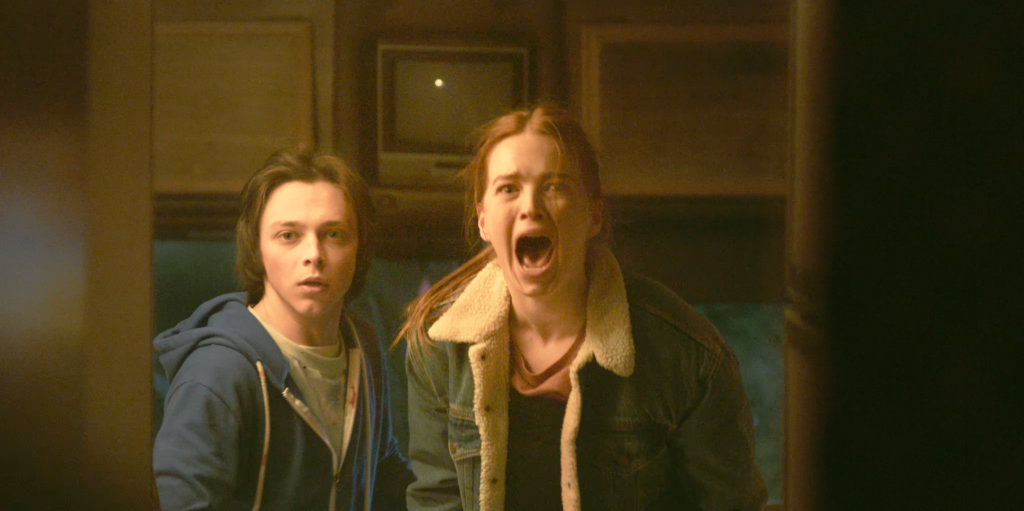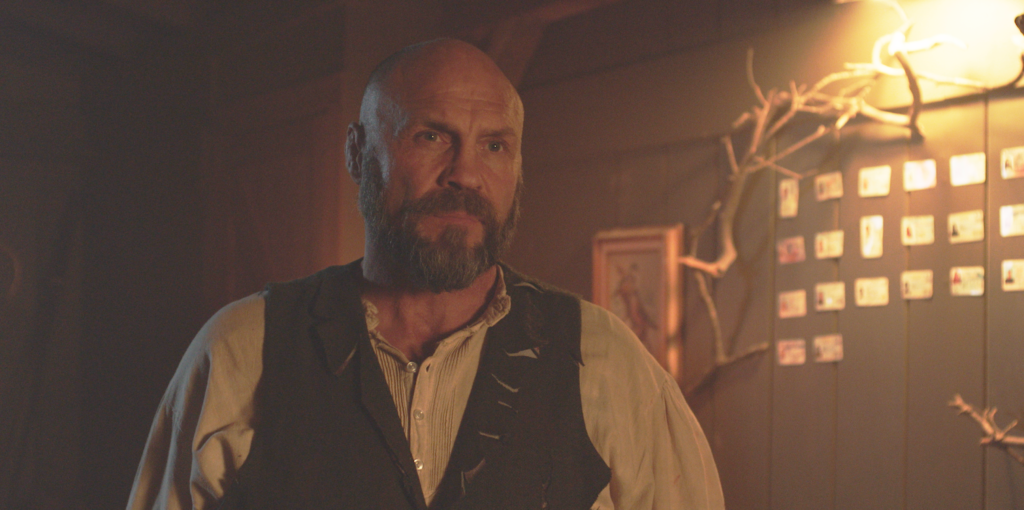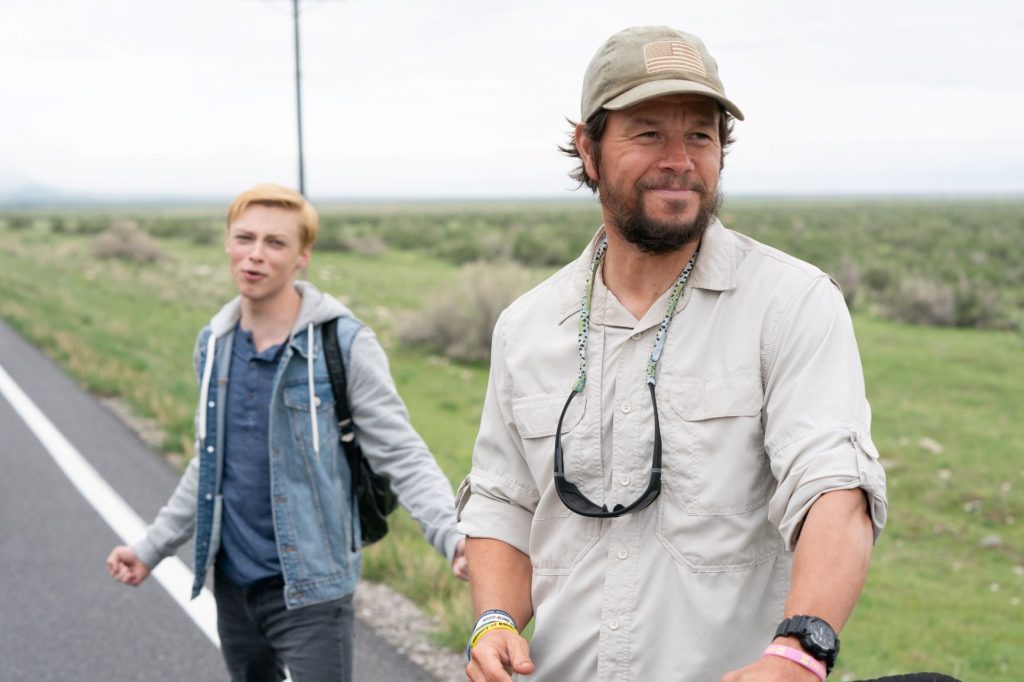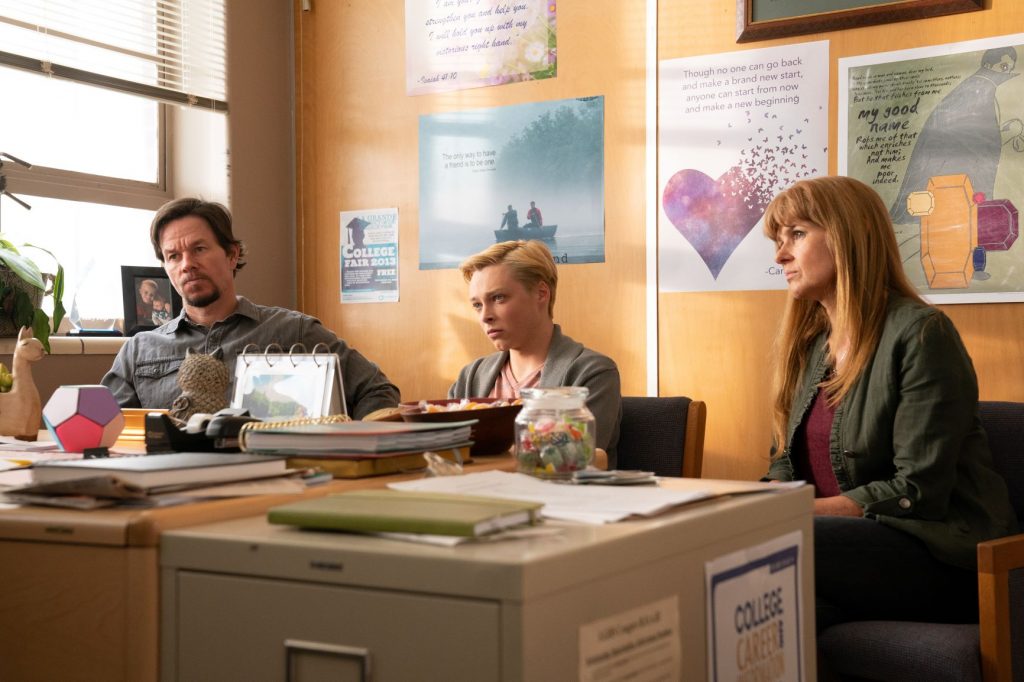November 3, 2023
by Carla Hay

Directed by Colton Tran
Culture Representation: Taking place in Southern California, the horror film “The Bell Keeper” features a predominantly white cast of characters (with one African American and one Latina) representing the working-class and middle-class.
Culture Clash: Several young people travel to a remote camping area that is believed to be the hunting ground for a serial killer who appears after a mysterious bell is rung in the woods.
Culture Audience: “The Bell Keeper” will appeal primarily to people who don’t mind watching terrible horror films.

“The Bell Keeper” is about terror that is unleashed after anyone rings a mysterious bell that’s in a remote wooded area. A serial killer keeps vigil over the bell. Someone needs to sound the alarm that “The Bell Keeper” is pure dreck in horror filmmaking.
Directed by Colton Tran, “The Bell Keeper” tries very hard to be the type of horror film that drops in sarcastic jokes to lighten the mood. The problem is that this comedy in “The Bell Keeper” is cringeworthy, outdated, and just not funny at all. Joe Davison and Luke Genton co-wrote the awful screenplay for “The Bell Keeper.”
As bad as the movie’s screenplay is, the acting in “The Bell Keeper” is worse and makes everything much harder to watch until the movie’s idiotic ending. There are some tacky horror movies that are entertaining to watch because they are very self-aware of their low-quality filmmaking and have fun with it. “The Bell Keeper” is not that type of tacky horror movie.
“The Bell Keeper” takes place in an unnamed city in Southern California. The movie was filmed on location in Los Angeles, Santa Clarita, and Ventura County. The opening scene takes place at night and shows two gory murders in a (cliché alert) secluded wooded area that has the fictional name Bell Lake in the movie.
The first person murdered in the movie is a man in his late 20s named Gary Beaumont (played by Nick Theurer), who is beheaded by a muscular man carrying an ax. After killing Gary, the murderer takes Gary’s driver’s license because the killer collects the driver’s licenses of his victims and hangs these licenses on a wall in his home. Gary’s girlfriend Nadine (played by Bailey Castle) is tied to a chair in a shed-like building. The murderer then kills Nadine in the same way that he killed Gary.
Viewers soon find out that this killer’s name is Hank (played by Randy Couture), who has become a local legend (not in a good way), because he’s suspected of being a serial killer but has remained elusive. Hank is believed to be a recluse who lives somewhere in the woods, where there is a mysterious bell located outdoors. According to stories in the area, every time someone rings the bell, Hank appears to hunt down and kill whoever rang the bell and any willing accomplices.
After Gary and Nadine are murdered, a group of five young people take a trip to Bell Lake to make a documentary about urban legends. They arrive by a recreational vehicle camper that’s co-owned by the two brothers who are on the trip. Younger brother Liam (played by Reid Miller), who’s in his late teens, has been living in the camper after secretly dropping out of college. Liam, who loves smoking marijuana, has been making money by selling marijuana that he is growing in the camper.
Older brother Matthew, nicknamed Matt (played by Mike Manning), is in his mid-20s and is the opposite of Liam in many ways. Matt is arrogant, vain, and knows what he wants to do with his life. Liam and Matt have had a tense relationship because Matt has a long history of bullying and insulting Liam.
Although Matt and Liam both own the camper, Matt has to ask Liam’s permission to use the camper for the trip because Liam is the one who’s been paying for the upkeep of the camper, which is actually a grungy mess. Liam is tasked with being the driver for this trip. Matt is the cinematographer for this documentary crew.
Also on this trip is Matt’s confident and friendly girlfriend Holly (played by Cathy Marks), who is directing this amateur documentary. Holly has been trying to mend the fractured relationship between Matt and Liam. She’s hoping that this documentary will be the definitive documentary that will solve the mystery of Bell Lake. (In other words, you just know if Holly finds the notorious bell, she’ll want to ring it on camera and film what happens next.)
The other two people on the trip are sound technician Gabriel (played by Capri-Antoine Vaillancourt) and documentary host Megan (played by Alexis B. Santiago), who are hooking up with each other in a “friends with benefits” situation. Gabriel and Megan are both dimwitted and shallow. Megan is a diva who has some of the worst jokes in the movie.
On their way to Bell Lake, the five travel companions stop at a gas station in this remote area. Matt and Gabriel go in the gas station’s convenience store and meet a buffoonish park ranger named Eugene Carlson (played by Chaz Bono) and a menacing-looking cashier named Jodie (played by Bonnie Aarons), who both warn Matt and Gabriel not to go to Deer Lake when they find out that’s where these travelers are going.
Jodie shouts, “It’s not a joke!” She grabs Gabriel and yells at him: “Hank is ruthless!” Aarons gives a very over-the-top performance in “The Bell Keeper.” Even though Aarons shares top billing for “The Bell Keeper,” she’s only in this one scene in the movie. Her screen time is less than five minutes, but her performance is so extreme, it will probably make viewers laugh instead of feel terrified.
Meanwhile, outside the gas station, a woman in her early 20s is handing out copies of a missing person flyer. Her name is Brittany (played by Kathleen Kenny), and she’s the younger sister of Gary, the man who was slaughtered in the beginning of the movie. At this point in the story, no one except for the killer knows that Gary is dead. Brittany hands a flyer to Liam, who says he hasn’t seen Gary.
Liam is instantly smitten with Brittany, who says she’s headed to Bell Lake too, because that was the last-known place where Gary was seen with Nadine. Liam nervously tries to flirt with Brittany to let her know that he might want to date her. However, Brittany tells Liam that he has no chance with her because she’s a lesbian. Liam still wants to get to know Brittany better, so he invites her to set up her tent close to where the RV camper will be parked at Bell Lake.
The rest of “The Bell Keeper” alternates between boring scenes of people talking and poorly staged action scenes. Of course, the bell is found and rung. Hank comes out of the shadows and goes on a killing spree. The chase scenes are sloppily edited and don’t look believable at all.
As shown in the movie’s trailer, ringing the bell also causes those responsible to turn into demon-possessed creatures. It’s supposed to make “The Bell Keeper” viewers wonder: “Who’s the real menace here?” But it just makes it easier to predict who will live and who will die.
There’s also a part of the movie involving a devil worshipper named Jackson (played by Daniel Dasent), in a terribly conceived part of the story that just makes the plot more of a jumbled mess. “The Bell Keeper” filmmakers made an effort to not have the answers to the movie’s mystery be too obvious. But in doing so, there’s a revelation that just creates more plot holes.
“The Bell Keeper” has some watchable moments when it comes to the friendship that develops between Liam and Brittany. But the acting in this movie is so relentlessly terrible, it takes you out of the intended horror, and it ruins the movie. The worst acting in “The Bell Keeper” is from Couture, who recites his lines as if he’s reading a dictionary that he has a hard time understanding. “The Bell Keeper” is simply one in a seemingly endless stream of trashy horror movies that aren’t very fun to watch and are quickly forgetton.
Screen Media Films released “The Bell Keeper” in select U.S. cinemas, on digital and VOD on October 13, 2023. The movie will be released on Blu-ray and DVD on December 5, 2023.


